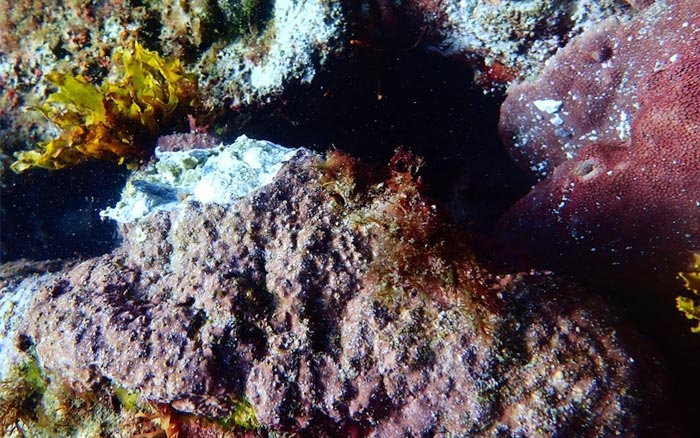Revealing the ramifications of ocean acidification for coralline algae

An international team including University of Tsukuba researchers has revealed that most coralline algae experience negative effects from ocean acidification. Analysis of previous studies showed that changes in ocean chemistry can lead to declines in calcification rates, abundance, growth, and recruitment of coralline algae, but some species showed greater resilience than others. Ocean acidification was revealed as an important driver of change and the physiology of different species determined their response to changing conditions.
Credit: University of Tsukuba
Researchers find that most coralline algae are negatively affected by ocean acidification, but some species may be more resilient than others.
Scientists have long suspected that coralline algae are particularly sensitive to changes in ocean chemistry. Now, researchers have found that most species of coralline algae studied are negatively affected by ocean acidification.
In a new study published in Global Change Biology, an international team, including researchers from the University of Tsukuba, revealed that lower seawater pH is associated with decreases in the abundance, calcification rates, and recruitment of coralline algae. As levels of carbon dioxide increase in the atmosphere, larger amounts are absorbed by the oceans. The resulting changes in ocean chemistry spell trouble for calcifying species like corals and coralline algae.
Coralline algae are critical species in shallow marine ecosystems globally. By creating calcium carbonate skeletons, these algae act as “cement” for reef systems and provide new substrate for corals and other organisms to settle on. With ocean acidification, less carbonate is available to build these skeletons.
The effects of ocean acidification on different species of coralline algae have been studied for a number of years but the overall outlook for these species is unclear. The team reviewed all available studies on coralline algae and ocean acidification and used a variety of methods to tease out overall patterns.
The clearest trends were the effects of ocean acidification on calcification; as pH declined, calcification rates decreased. Other effects included reduced abundance and recruitment. But not all species respond in the same way.
“Some species seem to be more robust,” says Professor Ben P. Harvey, coauthor of the study. “We found that coralline algae in the family Mesophyllumaceae appear to be more resilient. The physiological responses of different algae to ocean acidification will affect how resilient, or susceptible, they are.” Key questions remain about those processes and differences between species.
Ocean acidification is not happening in isolation, and the team also looked at other drivers of change in these ecosystems, like temperature.
“We know that stressors like temperature and overfishing can have a strong influence on marine ecosystems,” says coauthor Professor Shigeki Wada. “But it’s only fairly recently that ocean acidification has been identified as a large-scale driver of change”.
When the authors looked at the relative importance of different influences on calcification rates and growth, ocean acidification was a dominant factor driving change.
Since the Industrial Revolution, ocean pH has already dropped by 0.1 units and it seems likely that ocean acidification is already affecting coralline algae ecology. An important next step is investigating the physiological mechanisms of calcification in different species. Understanding whether some species may acclimatize to changing conditions could provide insights into the future of these shallow marine ecosystems.
The article “Understanding coralline algal responses to ocean acidification: Meta-analysis and synthesis” was published in Global Change Biology at DOI: 10.1111/gcb.15899.
Funding: Funding received from the Japan Society for the Promotion of Science, Grant/Award Number: 17K17622; the Ministry of Environment, Japan, Grant/Award Number: 4RF-1701; the International Educational and Research Laboratory Program, University of Tsukuba; and the Royal Society Te Apārangi, Grant/Award Number: RDF-VUW1701.
Journal: Global Change Biology
DOI: 10.1111/gcb.15899
Article Title: Understanding coralline algal responses to ocean acidification: Meta-analysis and synthesis
Media Contact
Naoko Yamashina
University of Tsukuba
kohositu@un.tsukuba.ac.jp
All latest news from the category: Ecology, The Environment and Conservation
This complex theme deals primarily with interactions between organisms and the environmental factors that impact them, but to a greater extent between individual inanimate environmental factors.
innovations-report offers informative reports and articles on topics such as climate protection, landscape conservation, ecological systems, wildlife and nature parks and ecosystem efficiency and balance.
Newest articles

Largest magnetic anisotropy of a molecule measured at BESSY II
At the Berlin synchrotron radiation source BESSY II, the largest magnetic anisotropy of a single molecule ever measured experimentally has been determined. The larger this anisotropy is, the better a…

Breaking boundaries: Researchers isolate quantum coherence in classical light systems
LSU quantum researchers uncover hidden quantum behaviors within classical light, which could make quantum technologies robust. Understanding the boundary between classical and quantum physics has long been a central question…

MRI-first strategy for prostate cancer detection proves to be safe
Active monitoring is a sufficiently safe option when prostate MRI findings are negative. There are several strategies for the early detection of prostate cancer. The first step is often a…



